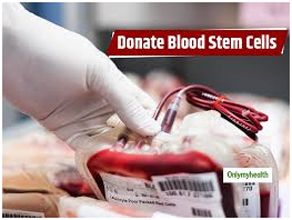
Blood cancer is one of the top 10 cancers in India and as per the latest Cancer Report of the Indian Council of Medical Research (ICMR), it is estimated that by 2025 nearly 1.38 lakh people would be affected. Currently, over 1 lakh people are suffering with a form of blood cancer or other blood disorder such as Thalassemia and Aplastic Anemia. Blood cancer accounts for 8 percent of all new cases of cancer diagnosed in India. Despite such a huge burden, there is a lack of awareness and misconceptions in the Indian population about the treatment options.

There used to be a time that blood cancer meant the end of the road for a patient. But the recent medical advancements have made treatment options available for blood cancer and blood disorder patients. One such important treatment option is a blood stem cell transplant.
A blood stem cell transplant is often the only chance at survival for a patient battling blood cancer. Healthy bone marrow and blood cells are needed for a normal life; however, blood cancer patients have defects in their blood-forming system, that causes cancer cells to enter the bloodstream and multiply uncontrollably, crowding out the healthy cells and prevent them from fighting infections.
A blood stem cell transplant takes a donor’s healthy blood-forming cells and puts them into the patient’s bloodstream, where they begin to grow and make healthy red blood cells, white blood cells and platelets. Patients receive high doses of chemotherapy to prepare their body for the transplant. Then on the transplant day, the patient receives the donated cells in a process that is like getting blood or medicine through an intravenous (IV) catheter, or tube.
From where do healthy blood stem cell comes from?
Blood stem cells can be donated from someone else, an adult that can be either their family member or an unrelated donor. 70 percent of patients do not have a fully matched donor in their family and they depend on an unrelated donor registered in the database of donor registries.
Likelihood of finding a matching donor
Finding a matching donor is like finding a needle in the haystack, it is one in a million chances that a matching donor is found for a patient. The best stem cell transplant outcomes happen when a patient’s human leukocyte antigen (HLA) and the HLA of a registered donor closely match. This is much more complex than matching blood types. HLA is a protein – or marker – found on most cells in your body. Your immune system uses HLA markers to know which cells belong in your body and which does not.
The role of ethnicity
The likelihood of finding a match for a patient in need of a transplant depends on the patient’s ethnic background. Because genetic traits used to determine a match are inherited, patients are most likely to match donors who share the same ethnic background.
How to become a blood stem cell donor
When your register with a stem cell registry such as DKMS-BMST, you are taking the first step to be the hope for patients with blood cancers and other blood disorders. It is also a commitment to take the next step if a patient needs you to donate your blood stem cells for lifesaving blood stem cell transplantation.
Any healthy individual between the ages of 18-50 can register online as a potential blood stem donor. Registration requires a sample of cells collected by swabbing the inside of your cheeks. When there is a patient in need of a transplant, a search is then carried out to find an unrelated match. A registry then uses your data to compare specific protein markers (HLA) with HLA markers of patients who need a stem cell transplant.
When you are matched to a patient, you will undergo tests to find if you are medically fit to donate. Blood stem cell donation is done via the Peripheral Blood Stem Cell (PBSC) donation process which is similar to blood platelet donation.
Indians have unique ethnicity, thus, adding more potential blood stem cell donors of diverse ethnicity will increase the chances for Indian patients to find a matching blood stem cell donor and get a second chance at life.
Patrick Paul is the CEO of DKMS BMST Foundation India












